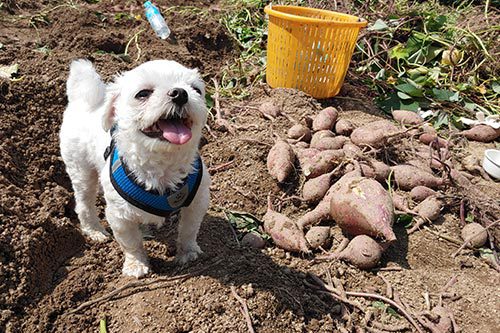Can Dogs Eat Sweet Potatoes?
If you’re wondering whether sweet potatoes are safe for your dog, you’re not alone. Many dog owners want to provide their pets with healthy, nutritious treats, but it’s important to know which foods are safe. Sweet potatoes are a popular vegetable in many households, and their natural sweetness might make them seem like a good option for your dog. In this blog, we’ll explore whether dogs can eat sweet potatoes, the benefits they offer, and how to safely include them in your dog’s diet. For any additional questions or if you’re unsure about your pet’s diet, feel free to contact Limerick Veterinary Hospital at (610) 489-2848 or book an appointment online for expert advice.

Are Sweet Potatoes Safe for Dogs?
Yes, dogs can eat sweet potatoes, but there are a few things to keep in mind before serving them to your pet. Sweet potatoes are packed with vitamins and minerals, such as vitamin A, vitamin C, and potassium, which can benefit your dog. However, like all foods, moderation is key. Feeding too much of any one type of food, including sweet potatoes, can cause digestive issues.
It’s important to serve sweet potatoes plain, without any added salt, butter, or seasonings. These additives can upset your dog’s stomach and cause health problems. Raw sweet potatoes should also be avoided, as they can be difficult for dogs to digest and might pose a choking hazard. Cooking sweet potatoes thoroughly ensures that your dog can safely enjoy this nutritious vegetable.
Nutritional Benefits of Sweet Potatoes
Sweet potatoes are rich in several nutrients that can support your dog’s health when included as part of a balanced diet. The most notable nutrient in sweet potatoes is vitamin A. This vitamin is essential for maintaining healthy skin, coat, and eyes in dogs. Additionally, it helps support their immune system.
Sweet potatoes are also a good source of dietary fiber. Fiber aids in digestion by helping food move smoothly through the digestive tract. This can be especially helpful for dogs that occasionally experience constipation. While sweet potatoes can offer these benefits, you should still feed them in moderation to prevent any digestive upset, such as diarrhea or bloating.
Along with fiber and vitamin A, sweet potatoes provide other vitamins and minerals, including:
- Vitamin C: An antioxidant that supports the immune system and helps combat inflammation.
- Potassium: An important mineral that supports heart health and muscle function.
- B Vitamins: These help convert food into energy and support your dog’s metabolism.
These nutrients can be a healthy addition to your dog’s diet, but they shouldn’t replace their regular food. Sweet potatoes should only be given as an occasional treat or a supplement to their regular meals.
How to Prepare Sweet Potatoes for Your Dog
When preparing sweet potatoes for your dog, keep things simple. Plain, cooked sweet potatoes are the best option. You can bake, boil, or steam them, but be sure they are soft and easy for your dog to eat. Avoid frying sweet potatoes, as the added oils and fats can lead to weight gain or upset your dog’s digestive system.
Always remove the skin from the sweet potatoes before feeding them to your dog. While the skin isn’t toxic, it can be hard for dogs to digest, especially for smaller breeds. Cutting the sweet potatoes into small, bite-sized pieces can also make them easier to eat and reduce the risk of choking.
It’s also important to introduce sweet potatoes gradually, especially if your dog has never eaten them before. Start with a small amount and monitor your dog for any signs of stomach upset. If your dog handles them well, you can occasionally add them to their diet as a treat.
Potential Risks of Feeding Sweet Potatoes to Dogs
While sweet potatoes are generally safe for dogs, there are some potential risks to be aware of. Feeding your dog too many sweet potatoes can lead to digestive issues, including gas, bloating, or diarrhea. As with any new food, it’s a good idea to introduce sweet potatoes slowly and in moderation to avoid overwhelming your dog’s digestive system.
Another consideration is the high glycemic index of sweet potatoes. They can cause a spike in blood sugar, which may not be suitable for dogs with diabetes or other conditions that affect blood sugar levels. If your dog has a pre-existing medical condition, it’s best to consult with your veterinarian before offering sweet potatoes or any other new foods.
In some rare cases, dogs may have food allergies or sensitivities to sweet potatoes. Symptoms of an allergic reaction can include itching, swelling, or gastrointestinal upset. If you notice any unusual reactions after your dog eats sweet potatoes, contact Limerick Veterinary Hospital for guidance.
Can Sweet Potatoes Be a Regular Part of Your Dog’s Diet?
Sweet potatoes can be a nutritious addition to your dog’s diet, but they should not be a primary food source. They are a healthy treat when given occasionally, but your dog’s main diet should consist of high-quality, balanced dog food that meets all of their nutritional needs.
While sweet potatoes offer fiber and essential vitamins, they do not provide the complete nutrition your dog needs to thrive. Overfeeding sweet potatoes or relying on them as a staple in your dog’s diet could lead to nutritional imbalances. Always ensure that your dog’s meals are well-rounded and tailored to their specific dietary needs.
At Limerick Veterinary Hospital, we recommend offering sweet potatoes as an occasional treat or supplement to your dog’s regular meals. If you have any concerns about your pet’s diet or need help creating a balanced nutrition plan, our team is here to assist you. Feel free to give us a call at (610) 489-2848 or book an appointment online to schedule a consultation.
Signs of Overfeeding or Sensitivity to Sweet Potatoes
As with any treat, it’s important to watch for signs that your dog may be getting too much or not reacting well to sweet potatoes. Common signs of overfeeding or sensitivity include:
- Diarrhea or loose stools
- Excessive gas or bloating
- Vomiting
- Weight gain
If you notice any of these symptoms after your dog eats sweet potatoes, it’s a good idea to cut back or eliminate them from their diet. In cases of severe or persistent symptoms, it’s best to contact your veterinarian for advice.
If you are unsure whether sweet potatoes are right for your dog, you can always consult with the veterinary team at Limerick Veterinary Hospital. Our staff can help you determine the best treats and meals for your dog based on their individual needs.
Contact Limerick Veterinary Hospital for Nutrition Advice
Feeding your dog a balanced diet is key to their long-term health. Sweet potatoes can be a safe and nutritious treat when given in moderation and prepared properly. However, it’s always a good idea to consult with your veterinarian before making any major changes to your dog’s diet, especially if your dog has existing health conditions.
At Limerick Veterinary Hospital, we’re here to help you make informed decisions about your dog’s nutrition. If you have any questions or would like more information on how to safely include sweet potatoes in your dog’s diet, don’t hesitate to reach out. Call us at (610) 489-2848 or book an appointment online today. We’re happy to provide personalized advice and ensure your dog is getting the right balance of nutrients.
